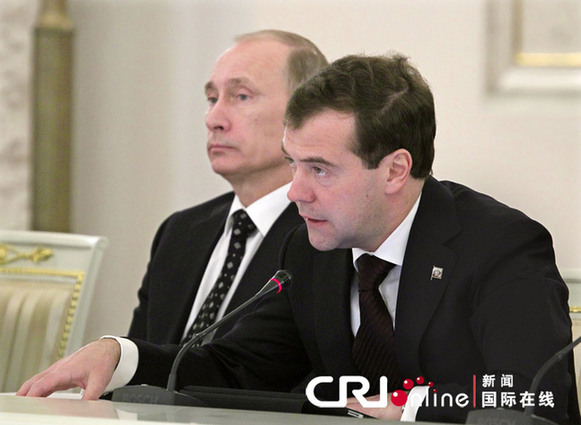Putin, Medvedev clash over Soviet model
While ethnic Russians make up four-fifths of Russia's population of 142 million, the country is also home to about 180 ethnic groups. The Caucasus region, with its mountainous terrain and isolated valleys, hosts at least 100 ethnicities including Chechens, who have waged two separatist wars against Moscow after the 1991 collapse of the Soviet Union.
 |
|
Russia's President Dmitry Medvedev(R) and Russian Prime Minister Vladimir Putin(L) at a meeting on December 28, 2010 |
Putin suggested Monday that the authorities might restore harsh Soviet era-restrictions on movement into big cities like Moscow or St. Petersburg. Such a move would target dark-complexioned people from the Caucasus, who flee their impoverished regions for big cities.
"We went for liberal rules of registration too early," Putin said.
Medvedev, however, warned against trying to isolate ethnic groups. "We can't block people from moving around the country, although we need to control that," he said. "We are a single country, and we must learn to live together."
Medvedev warned that ethnic tensions could break Russia up if the government fails to stem violent nationalism and act more harshly to disperse riots.
"Interethnic conflicts are deadly dangerous for Russia," Medvedev said. "We mustn't allow some dimwits to destroy our common home."
Putin also suggested limiting jury trials, introduced all over Russia in recent years. He said that trials by jury for suspects in murders and other grave crimes should only be held on an inter-region level instead of a local level to prevent acquittals based on clan loyalties.
During his eight-year presidency, Putin steadily rolled back Russia's post-Soviet freedoms, abolishing direct elections of provincial governors and pushing other electoral changes that strengthened the Kremlin's control over Russia's political life. The former KGB officer once described the Soviet collapse as the "greatest geopolitical catastrophe of the 20th century."
Medvedev has been markedly more critical about the Soviet past, trying to cater to a more liberal and educated part of the electorate and improve Russia's image in the West. But differences between the two leaders are mostly limited to style and Medvedev so far has acted as a loyal placeholder for Putin.
Nikolai Petrov of the Carnegie Endowment's Moscow office suggested that Monday's exchange between the two leaders could be aimed to distract attention from a second trial of jailed oil tycoon Mikhail Khodorkovsky. The judge on Monday declared Khodorkovsky guilty of theft in a verdict that could keep the tycoon behind bars for years to prevent him from challenging Putin's power.
 0
0 






